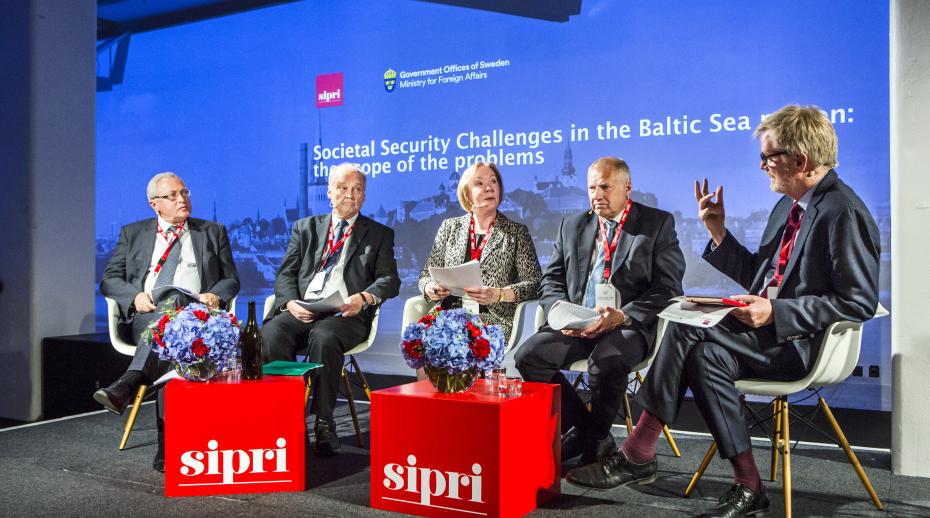
(Stockholm 12 June 2018) More than 150 policymakers, researchers and practitioners are gathering in Stockholm at Fotografiska on June 11–12 for the international conference addressing the complexity of societal security challenges in the Baltic Sea region. Watch the livestream of the opening session here.
The conference was opened by Ambassador Jan Eliasson, former United Nations Deputy Secretary-General and current Chair of SIPRI. Ambassador Eliasson remarked that ‘security starts at home’ and that the bedrock for national, regional and international security is a well-functioning society.
HE Margot Wallström, Minister for Foreign Affairs (Sweden), gave the keynote address for the conference. Wallström underlined the reality of how fragile societies can become if we do not focus on common security, specifically identifying Russia’s annexation of Crimea as a threat to European security.
The keynote address was followed by the opening plenary ‘Societal security challenges in the Baltic Sea region: The scope of the problems’ moderated by Dan Smith, SIPRI Director. Smith first asked Ambassador Maira Mora, Director General, Council of the Baltic Sea States Secretariat, to outline the range of problems faced by the Baltic Sea region.
Ambassador Mora recognized that digitization, urbanization and climate change were the three most pressing challenges faced by the region. Ambassador Mora cited a recent European public opinion poll that showed there had been a significant fall in the proportion of respondents who think that Europe is a secure place to live in.
Rainer Saks, Secretary General, Ministry of Foreign Affairs (Estonia), further expanded on this theme by highlighting both pollution and natural disasters as areas of risk but also as areas where successful regional cooperation continues to develop.
Professor Bengt Sundelius, Strategic Adviser, Swedish Civil Contingencies Agency, picked up on Ambassador Eliasson’s point that ‘security starts at home’ and added that ‘no one is home alone’, alluding to the importance of regional cooperation as a means to ensure societal safety.
Igor Neverov, Director, Second European Department, Ministry of Foreign Affairs (Russia), rounded out the discussion by outlining Russia’s view on regional security. Neverov noted that Russia does not see any challenges in the region that would require military solutions. From a Russian perspective, organized crime, the trafficking of human beings, and natural and man-made disasters were stated as the most pertinent issues to regional security.
The conference will continue today with breakout sessions on topics such as climate change adaptation, nuclear security cooperation, strengthening resilience against extremism, gender-based violence, and approaches to reduce urban violence. The plenary sessions will be livestreamed on SIPRI’s Facebook and YouTube channel.
About SIPRI and the conference on the Baltic Sea region
The international conference ‘Managing complexity: Addressing societal security challenges in the Baltic Sea region’ forms a basis to further build on existing institutions and frameworks for collaboration to address the societal security challenges faced by Baltic Sea states. It is co-hosted by SIPRI and the Swedish Ministry for Foreign Affairs.
SIPRI is an independent international institute dedicated to research into conflict, armaments, arms control and disarmament. Established in 1966, SIPRI provides data, analysis and recommendations, based on open sources.
The Ministry for Foreign Affairs is responsible for developing and implementing Sweden’s foreign policy. In addition to overseeing the operations of the country’s embassies and consulates, the Ministry for Foreign Affairs is responsible for Sweden’s development cooperation, trade and investment.
For editors
- Conference sessions will be live-streamed on SIPRI’s YouTube channel
- Photos and videos will be made available on the SIPRI website
- Twitter: @SIPRIorg @SweMFA #BalticSeaRegion #SIPRIevents
- Facebook: www.facebook.com/sipri.org